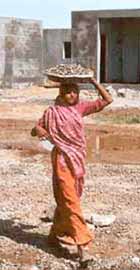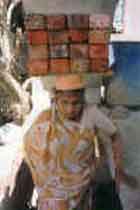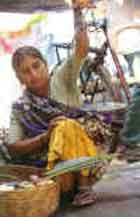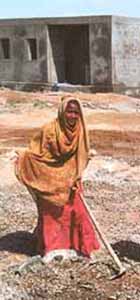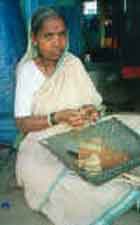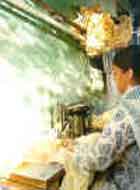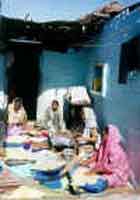Self Employed Womens Association - SEWA
| Opposite Victoria Garden Bhadra Ahmedabad – 380001 |
||
| Tel | : | 079 - 25 50 64 44/25 50 64 77 |
| Fax | : | 079 - 25 50 64 46 |
| : | mail@sewa.org | |
| Web | : | www.sewa.org |
SEWA is a trade union registered in 1972. SEWA is both an organisation and a movement. SEWA has a membership base of 700000 women workers in seven states of India. The majority of SEWA’s members (5,35,000) live in the state of Gujarat in northwestern India and two third of SEWA’s members come from the rural areas.The SEWA movement is enhanced by its being a confluence of three movements: the labour movement, the cooperative movement and the women’s movement.
It is an organisation of poor, self-employed women workers. These are women who earn a living through their own labour or small businesses. They do not obtain regular salaried employment with welfare benefits like workers in the organised sector. They are the unprotected labour force of India. Constituting 93% of the labour force, these are workers of the unorganised sector. Of the female labour force in India, more than 94% are in the unorganised sector. However their work is not counted and hence re-mains invisible. In fact, women workers themselves remain uncounted, undercounted and invisible.
SEWA organizes its members to gain full employment and self-reliance - the two main objectives of SEWA -through the joint strategy of struggle and development. Full employment means employment whereby workers obtain work security, income security, food security and social security (at least health care, child care and shelter). By organizing these women workers to attain full employment, SEWA helps them to become autonomous and economically self reliant, both individually and collectively, including in terms of decision making ability.
This strategy is carried out through joint action of Union and Cooperatives, two independent democratic forms of organisations, which can be owned, controlled and run by workers themselves.
All activities at SEWA are planned and implemented with an integrated approach this means that every member has access to work and income security, social security services, financial services and capacity building. Through the strategy of struggle and development and the integrated approach women can become strong and self-reliant.
SEWA in the past three decades has achieved collective strength by organising women into cooperative groups, district associations at the rural level and federations and trade union at the urban level. At present SEWA has organised its members, trade-wise in about 100 cooperatives.
SEWA’s approach is demand driven. It identifies the needs and issues of the women and the community, links it strategically with existing government programmes and schemes, rather than creating parallel programmes. The main activities of SEWA are:
- Organising the informal Sector
- Campaigns
While organizing women and supporting them in building their own workers’ organisations, the need for mass mobilization through campaigns became evident. This mass mobilization strengthens the SEWA movement and at the same time highlights their own pressing needs. Mobilization is done as a part of a campaign based on the identified issues. Local leaders, based on the monthly meetings with the members identify the issues. Issues that affect a large number of people and need immediate attention are selected for the campaign. - Livelihood security activities
a) Artisan Support Programme
b) Weavers Support Programme
c) Salt Farming
d) Poultry Farming
e) Gum Collection f) Masonry Training
g) Dairy & Animal Husbandry Activities - Support Activities
a) Health Care
b) Child Care
c) Savings, Credit and Insurance
d) Housing Support - Eco-regeneration Activities
a) Nursery Raising
b) Forestry Campaign
c) Water Campaign
d) Watershed Activities
e) Fodder Security - Marketing Support
In order to provide marketing support to the women producers and trainings to produce quality products, SEWA Gram Mahila Haat and SEWA Trade Facilitation Centre (STFC) were set-up by SEWA. SEWA Gram Mahila Haat was set-up with assistance from the Government of Gujarat with the main objective to eliminate middlemen and provide market-oriented services to its members so they are in direct contact with the customers and help them reach main stream markets. Gram Haat helps the women producers in marketing the Agricultural products, salt and gum.
SEWA started STFC in 2000 in order to expand its marketing base for embroidery handicrafts, and thereby increase employment and income for SEWA embroiderers. The main task of STFC is to create and search national and international market for its handicrafts products. STFC is registered as a not for profit company registered under Sec. 25 of the Indian Companies Act. This unique business model for poverty alleviation operates via. a unique principle whereby the Company will be owned by the disaster-affected artisans themselves.
Gandhian thinking is the guiding force for SEWA’s poor, self-employed members in organising for social change. At SEWA they follow the principles of satya (truth), ahimsa (non-violence), sarvadharma (integrating all faiths, all people) and khadi (propagation of local employment and self reliance)
SEWA has established linkages at the national and international level. It also has an Educational collaboration with the Institute of Social Studies, The Hague.




